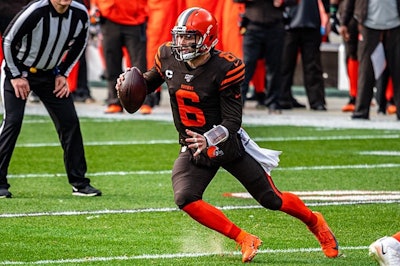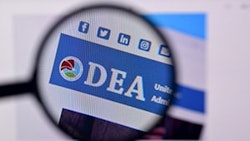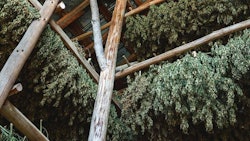
On Oct. 13, cannabidiol (CBD) company Beam announced Cleveland Browns quarterback Baker Mayfield as its newest brand ambassador and investor. Two days later, NFL players across the league received a warning not to follow suit.
The NFL Players Association (NFLPA), the union representing NFL players, sent a letter to the athletes Oct. 15 advising them that the league had changed its policy to ban them from endorsing cannabinoid products.
Bleachers reporter Master Tesfatsion first broke the news of the updated policy, which now reads: “...NFL players, coaches, and other employees must not endorse or appear in advertisements for alcoholic beverages, tobacco, or cannabinoid products.”
The NFLPA said it had received several inquiries regarding NFL players’ ability to engage in promotion and endorsement of CBD companies. According to Front Office Sports, those inquiries had come from agents and marketing reps upset about Mayfield’s deal with Beam.
It remains unclear what punishment players would face for endorsing a CBD product, adds Front Office Sports.
However, Mayfield is one of a growing number of NFL players—and, more broadly, professional athletes—striking up deals with CBD companies.
Rob Gronkowski of the Tampa Bay Buccaneers announced a partnership with CBDMEDIC at the end of 2019. (He was retired at the time but has since re-joined the league, and his endorsement remains on CBDMEDIC’s Instagram page.) DeAndre Hopkins of the Arizona Cardinals announced in September his endorsement of BioSteel Sports Nutrition, which produces CBD products, although Hopkins has not endorsed any specific products.
Retired NFL players Steve Smith, Tiki Barber and Michael Vick are also among those that have also struck up deals with CBD companies.
The NFL's newest cannabis-related policy comes despite the league relaxing some of its marijuana policies this year. In March, the league announced players would no longer be suspended for positive marijuana tests. It also reduced its drug testing period from four months to two weeks at the start of the season, and it raised the allowed amount of THC from 35 nanograms to 150, according to Sporting News.
In 2019, some players were outspoken about cannabis use, resulting in a study into the potential use of marijuana as a pain management tool for players.
























